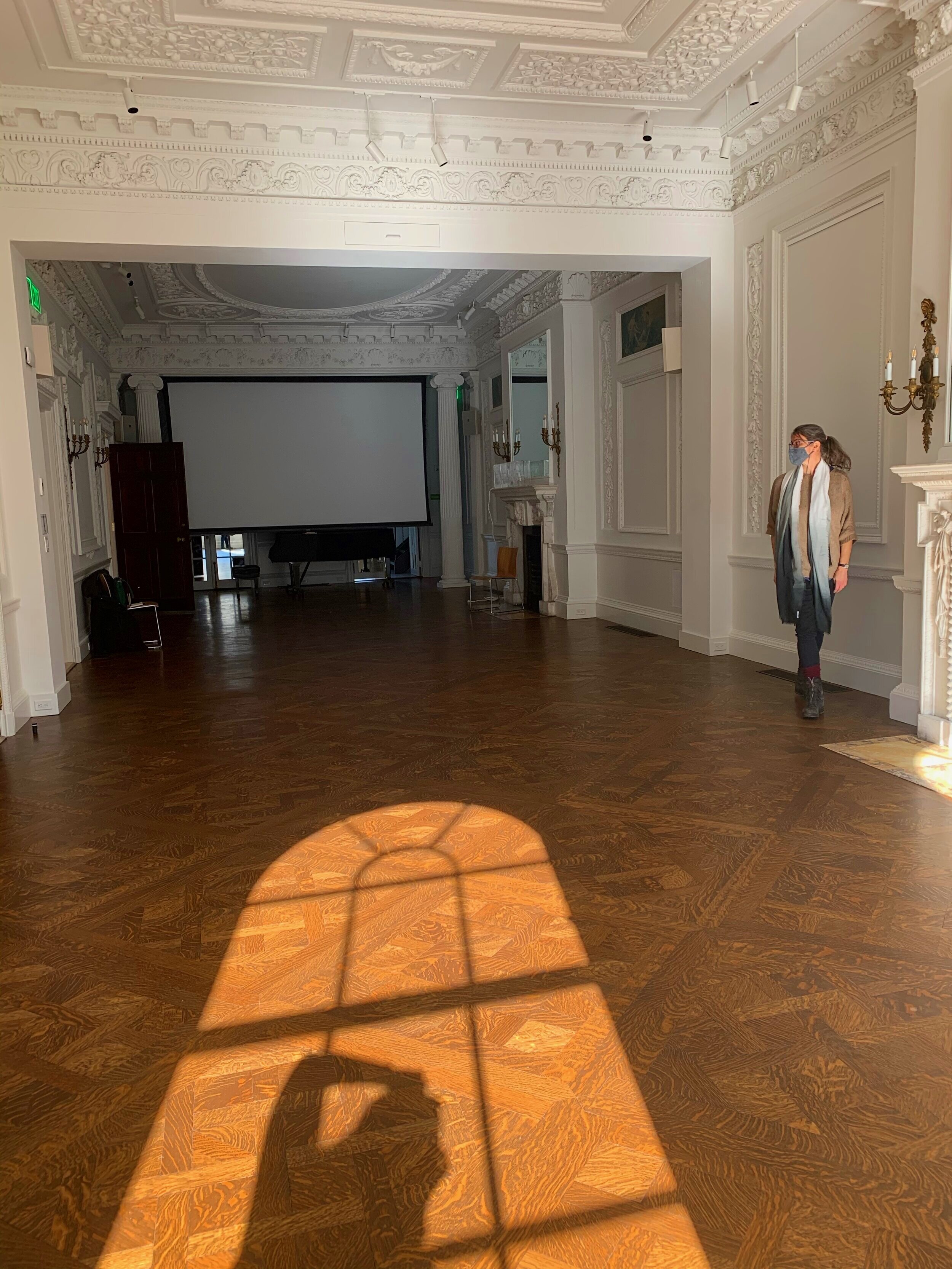The story behind “Threads of Assumption”
Just before the pandemic hit, as Maria was traveling and engaging in person with various young musicians, artists, and thinkers, an interesting pattern emerged. In the span of one month, she seemed to be consistently asked a variation on the same question: What are your experiences with sexism? The questions weren’t always so forward, but the message was clear: young female-identifying individuals were seeking to find some commonality in their shared experiences of discrimination on the basis of sex.
The project has been offered a residency at the Goethe-Institut’s Studio 170
Truth be told, this isn’t something that Maria has given much weight to when examining the trajectory of her career. She and I sat down together recently, and she said regarding sexism, for the most part, she has operated “under the umbrella of don’t talk about it, put your head down, be the best, and success will happen regardless of gender.” But the recent interest from her students caused her to take a step back and examine things more clearly. As early as high school, several of her male colleagues quit the drumline when she was named section leader. Later on in her adulthood, a trusted colleague commented that she was “too bubbly” to be an artist. She’s been in uncomfortable meetings, rehearsals, recording sessions, where male voices and attitudes have silenced her and degraded her talents and intellect. It’s easy to stuff down negative experiences, especially those with gender-related nuance, in the name of just continuing with one’s work. But, how do we effect change and stop the cycle in order to create a more equitable world if we don’t talk about it?
This question was the catalyst for the upcoming work Threads of Assumption: The Biases You Weave, a multidisciplinary exploration of the impact gender based harm has on one’s health, professional trajectory, and interpersonal relationships. Threads is a collaboration by Maria, Sofie Hodara, Martha Rettig, and U-Meleni Mhlaba-Adebo, is made possible by The Boston Foundations Live Arts Boston Grant and is in Residency at the Goethe Institut’s Studio 170. The project will be shown at the end of June, 2021.
Maria immediately recognized the inspiration to provide individuals with a way of sharing their stories, but in a way that was private and anonymous. She asked, “How can technology enable storytelling in a way that is new, but also healing? How can we stay personal, but also take the personal out if it?” These questions led to conversations with both artists and computer scientists. Artificial intelligence emerged as an appropriate medium; Maria had observed other artists’ work using AI, and did some of her own research. She says, “We are creating algorithms that are very binary in right/wrong. What if we played into that? If someone feels sexism, it feels very right/wrong, but to society, it still somehow remains very grey.” She realized that using AI, anecdotal experiences could be turned into data, and the rub created by a computer generated process could create a discomfort worth leaning into.
Early in-studio experimentations
So how does it all work? The source material for these stories is none other than YOU. Maria is currently seeking participants to have a 20 minute conversation with a close companion using an online platform called Bongo Focus. The platform will automatically generate 3 questions that the participants will discuss freely. Bongo Focus’ AI bot is essentially tracking language and vocal inflection in order to track sentiment and emotional trajectory. “The first thing we’re tracking is: how does how you’re telling your story affect you emotionally?” The bot will be able to latch onto general key words and concepts related to gender based harm and experiences. No voices or images will be taken, this project is 100% anonymous. Maria and her collaborators, including poet U-Meleni Mhlaba-Adebo, will take the data-- a grid like collection of numbers and time stamps-- to find key words and emotional tracks. They will then use this data to shape an abstract story-- a shared story-- one that tells the story that so many who have been impacted by sexism can recite. Because this concept is so new, there is no way to know for sure what (or if) certain patterns will emerge, but Maria anticipates that some sort of woven narrative will be generated.
The story that manifests will be the basis for interactive projections and lighting designs to be created with digital and installation artists, Martha Rettig and Sofie Hodara. When the work is presented in June, audiences will experience a multi-disciplinary display. Maria will provide the music-- percussion and electronics-- while U-Meleni will add spoken word and poetry. The physical design of the set will include threads and woven tactile materials, and will live on at the Goethe Institut for three days following the initial performance.
While Threads relies heavily on AI and technology, the project itself is very much a living, breathing thing. There is no way to no for sure what audience members will see, here, or feel once Threads is live. Furthermore, Threads can only exist with the help of it’s volunteer participants who are willing to share their stories. Here are the big bullet points for participating:
Choose a companion, date, and time for your conversation before May 22.
Fill out the participation form here. Once you complete the form, you will receive a confirmation e-mail with a link for the time of your conversation.
It’s time for your conversation! Click that link in the confirmation e-mail you received. You will then be prompted to sign up for Bongo Focus and confirm your e-mail address.
When prompted, you’ll be able to send an invitation to your companion for the conversation (they’ll also need to sign up for Bongo Focus and confirm their e-mail address).
Each of the 3 questions will pop up on the screen automatically, but you are welcome to let the conversation flow freely.
You’re done! And GET THIS: all participants will receive a $10 Amazon.com gift card for their time.
It cannot be overstated how crucial these conversations are to the development of Threads of Assumption: The Biases You Weave. We are calling on all female-identifying mfD fans to help by giving just 20 minute of their time to this collaborative exploration. It would be even better if you then share this with other people in your life who might be interested in participating. The more stories that are gathered, the more content to generate data, and therefore, the more opportunity for exploration and reflection on a topic that affects so many.
Click on the photos below to read more about the contributing artists on Threads. We will continue to provide updates on the progress of Threads of Assumption: The Biases You Weave!
Upper Left: Sofie Hodara // Upper Right: U-Meleni Mhlaba-Adebo (photo credit: Eroc Arroyo-Montano) // Lower Left: Maria Finkelmeier // Lower Right: Martha Rettig






